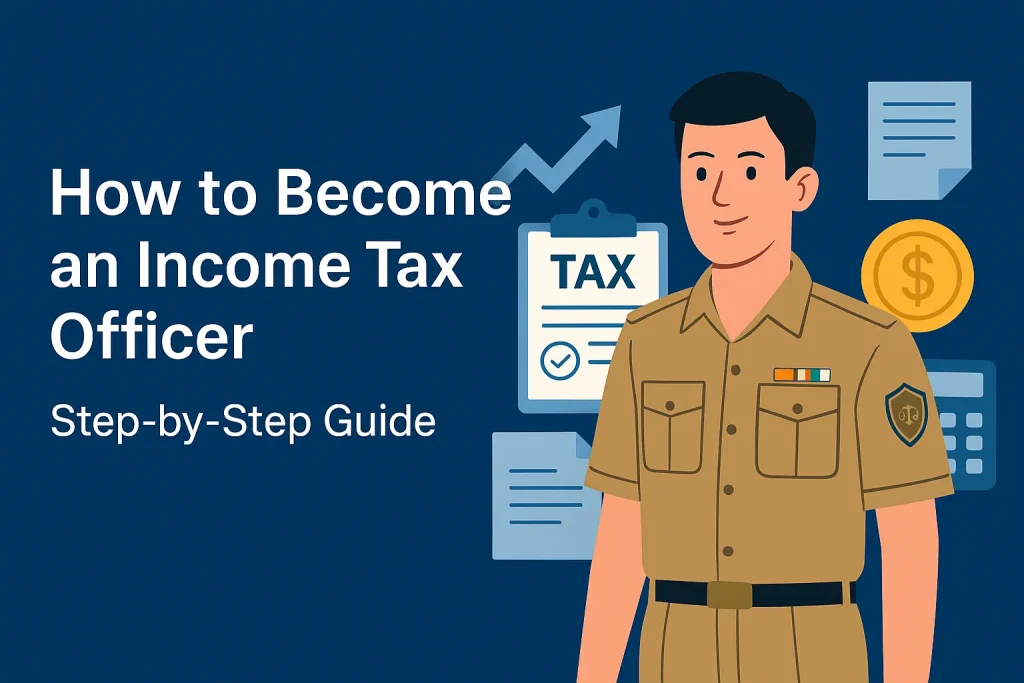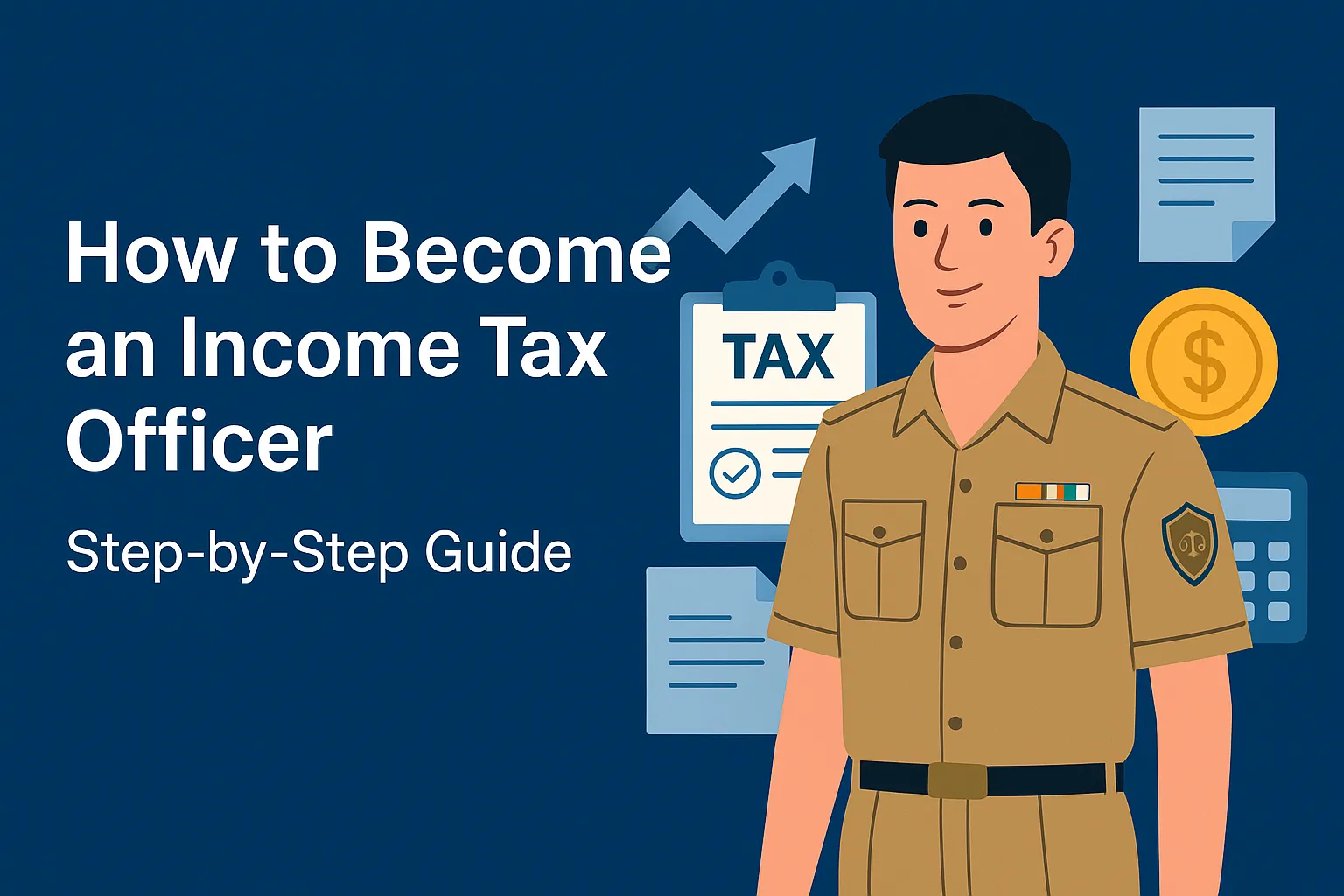
The post of an Income Tax Officer (ITO) in India is one of the most sought-after government jobs, known for its authority, prestige, stability, and impact.
Every year, thousands of aspirants dream of wearing this badge of honor and serving the nation by upholding financial discipline.
But the road to becoming an Income Tax Officer is not easy—it demands knowledge, patience, consistency, and resilience.
This article provides a step-by-step guide on how to become an Income Tax Officer, covering eligibility, exams, preparation strategies, salary, career growth, and, importantly, how the journey of an ITO can inspire anyone, regardless of whether they aim for this career or not.
Table of Contents
1. Who is an Income Tax Officer?
An Income Tax Officer is a government official under the Central Board of Direct Taxes (CBDT), which is part of the Department of Revenue, Ministry of Finance.
The primary responsibility of an ITO is to administer direct tax laws, ensure compliance, and curb tax evasion.
Key Responsibilities:
- Assessing and collecting income tax.
- Conducting surveys and raids in case of suspected evasion.
- Monitoring large-scale financial transactions.
- Ensuring compliance with the Income Tax Act.
- Guiding taxpayers in filing returns.
This role combines administrative authority with field investigation duties, making it both challenging and rewarding.
2. Why Choose a Career as an Income Tax Officer?
Becoming an ITO is not just about securing a government job—it’s about gaining respect, stability, and an opportunity to serve the nation.
Benefits of this Career:
- Prestige & Power – ITOs enjoy significant authority, especially in enforcing tax laws.
- Job Security – A permanent central government job with pension benefits.
- Financial Stability – Competitive salary, allowances, and perks.
- Career Growth – Regular promotions and chances to rise to senior positions.
- Nation-Building – Contributing directly to India’s financial discipline and development.
For women candidates especially, it provides a combination of career respect and stability, making it one of the most chosen posts in SSC CGL and UPSC exams.
3. Eligibility Criteria to Become an Income Tax Officer
The eligibility is common for both male and female candidates—merit alone determines success.
a) Nationality
- Must be a citizen of India.
- In some cases, citizens of Nepal, Bhutan, and Tibetan refugees (before Jan 1, 1962) may apply.
b) Educational Qualification
- A Bachelor’s degree in any discipline from a recognized university is mandatory.
- Final-year students can apply provisionally.
c) Age Limit
- General: 21–30 years
- OBC: 21–33 years
- SC/ST: 21–35 years
- PwBD: Additional 10 years relaxation.
d) Number of Attempts
- General: 6 attempts (UPSC)
- OBC: 9 attempts
- SC/ST: Unlimited (till age limit)
e) Physical & Medical Standards
- Good mental and physical health is necessary.
- For certain enforcement roles, fitness tests may be required.
Also Read:
4. Pathways to Becoming an Income Tax Officer
There are two main routes:
Route 1: Through UPSC Civil Services Examination (CSE)
- Conducted by Union Public Service Commission (UPSC).
- If selected with a good rank, candidates are allotted Indian Revenue Service (IRS – Income Tax).
- IRS officers are senior officials in the Income Tax Department, often supervising ITOs.
Route 2: Through SSC CGL (Staff Selection Commission – Combined Graduate Level Exam)
- The direct route to become an ITO.
- SSC CGL recruits candidates for Group B and Group C posts.
- The post of ITO falls under Group B.
Most candidates take the SSC CGL route, as it directly leads to the Income Tax Officer post, while UPSC CSE leads to IRS (a senior service).
5. SSC CGL Exam Pattern for Income Tax Officer
Tier 1 (Prelims – Online)
- General Intelligence & Reasoning – 25 Qs
- General Awareness – 25 Qs
- Quantitative Aptitude – 25 Qs
- English Comprehension – 25 Qs
- 200 marks, 60 minutes
Tier 2 (Mains – Online)
- Paper 1: Quantitative Aptitude
- Paper 2: English Language & Comprehension
- Paper 3: Statistics (optional for some posts)
- Paper 4: General Studies (Finance & Economics)
Tier 3 (Descriptive – Offline)
- Essay/Letter writing in English/Hindi.
Tier 4 (Skill Test/Verification)
- Computer proficiency test.
- Document verification and medical fitness.
After clearing all stages, selected candidates undergo training at the National Academy of Direct Taxes (NADT), Nagpur.
6. Career Growth of an Income Tax Officer
The career path is rewarding, with clear promotional avenues:
- Income Tax Officer
- Assistant Commissioner of Income Tax (ACIT)
- Deputy Commissioner of Income Tax (DCIT)
- Joint Commissioner of Income Tax (JCIT)
- Additional Commissioner of Income Tax (Addl. CIT)
- Commissioner of Income Tax (CIT)
- Principal Commissioner of Income Tax (Pr. CIT)
Some officers may eventually become Member, CBDT, the topmost post in the department.
7. Salary & Perks of an Income Tax Officer
a) Basic Pay (7th CPC, Level 7):
₹44,900 – ₹1,42,400
b) Allowances:
- Dearness Allowance (DA)
- House Rent Allowance (HRA)
- Travel Allowance (TA)
- Medical facilities
- Pension & retirement benefits
c) Perks:
- Official car (for certain posts)
- Staff support
- Accommodation in government quarters (subject to availability)
- Social respect and authority
Overall, the monthly in-hand salary of an ITO is around ₹70,000–₹80,000, depending on posting city.
8. Preparation Strategy for Aspiring Income Tax Officers
Step 1: Understand the Syllabus
Carefully go through SSC CGL/UPSC syllabus. Focus areas: Quant, Reasoning, English, GK, and Finance basics.
Step 2: Build Strong Basics
- Read NCERT books (6th–12th) for General Awareness.
- For Quant: R.S. Aggarwal.
- For English: Wren & Martin + daily newspaper reading.
Step 3: Practice Mock Tests
Daily practice improves speed and accuracy, especially for SSC CGL.
Step 4: Create a Timetable
Dedicate 6–8 hours daily with subject-wise slots.
Step 5: Stay Consistent
Most aspirants fail due to irregularity. Discipline is key.
Step 6: Learn from Toppers
Follow interviews of successful SSC/UPSC candidates to refine your strategy.
9. Challenges Faced by Aspirants
The journey to becoming an ITO is not easy. Candidates often face:
- Long preparation time (1–3 years).
- Pressure from family or society.
- Financial difficulties while preparing.
- High competition (millions of applicants, limited posts).
But it’s precisely this struggle that makes the journey inspirational.
Did yiu know UV Chahal also was income tax officer?
10. Inspirational Angle: Why the Journey of an ITO Inspires Everyone
The journey to becoming an Income Tax Officer is full of challenges. Yet, those who succeed share certain qualities that inspire people from all walks of life.
Life Lessons from an ITO’s Journey:
- Patience pays off – Success doesn’t come overnight; consistent effort matters.
- Hard work > Shortcuts – There’s no way around dedicated study.
- Equality through merit – The exam doesn’t see gender, caste, or background; only preparation counts.
- Resilience matters – Many officers failed multiple times before success.
- Nation before self – Their job is not just personal success but service to the nation.
Example of Inspiration:
Consider a candidate from a small village with minimal resources. They study under street lights, balance part-time jobs, and face repeated failures. Yet, after years of persistence, they finally clear SSC CGL and join as an Income Tax Officer.
This story is not rare—it is the reality of many officers today, and it shows that success is possible if you don’t give up.
11. How Anyone Can Take Inspiration from an Income Tax Officer
Even if you are not preparing for this career, the mindset of an ITO aspirant can inspire you:
- Students – Learn the value of discipline and consistency.
- Professionals – Adopt resilience and keep upskilling to grow in your career.
- Entrepreneurs – Like ITOs, face challenges boldly and stay persistent.
- Society at large – Respect women and men who break barriers to achieve their dreams.
The real lesson: Determination + Patience = Success.
12. Conclusion
Becoming an Income Tax Officer in India is a dream that requires determination, preparation, and resilience. The eligibility is simple—graduation, age within limits, and physical fitness—but the journey is tough, demanding months or even years of preparation.
Yet, this journey is also what makes it inspirational. An ITO is not just a government official—they are a symbol of merit, patience, and service to the nation.
Whether you aspire to become an Income Tax Officer or not, their journey teaches a universal truth:
Success is not about shortcuts. It’s about consistent effort, resilience against failures, and the courage to keep moving forward.
So, if you are dreaming of becoming an ITO—start today. And if you are not, take the inspiration from their journey to fuel your own path in life.
